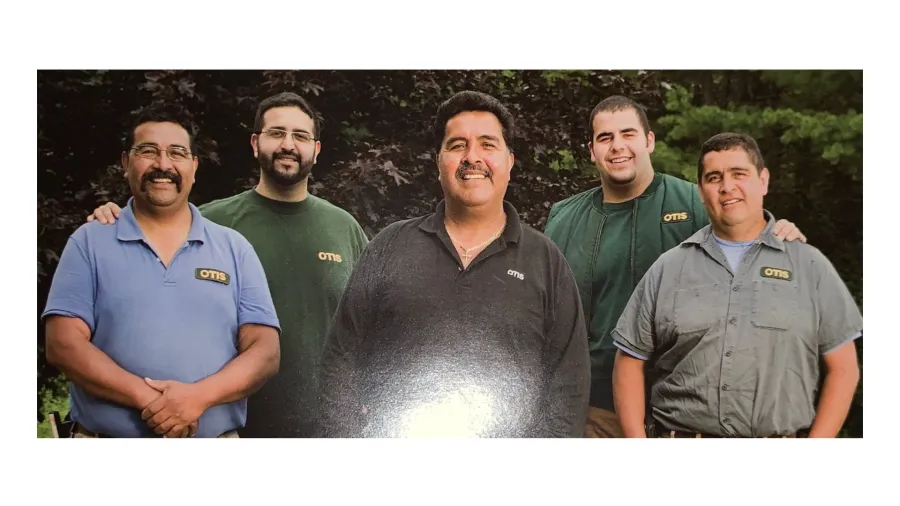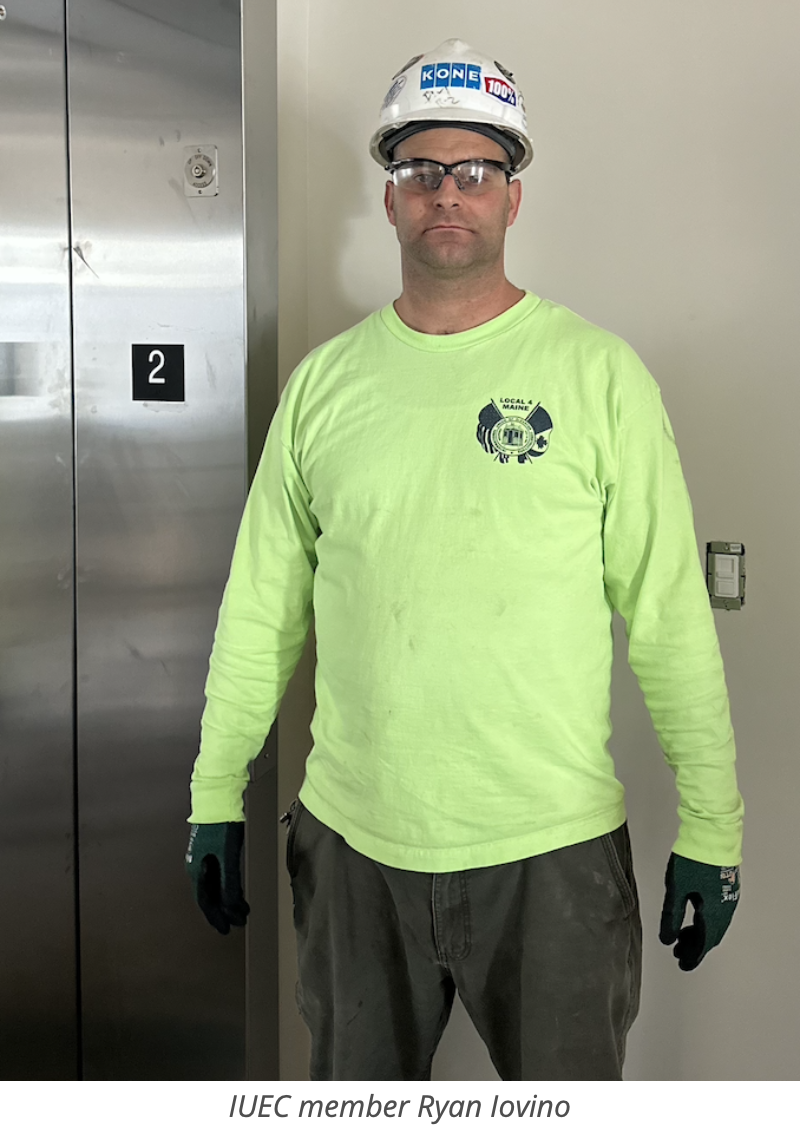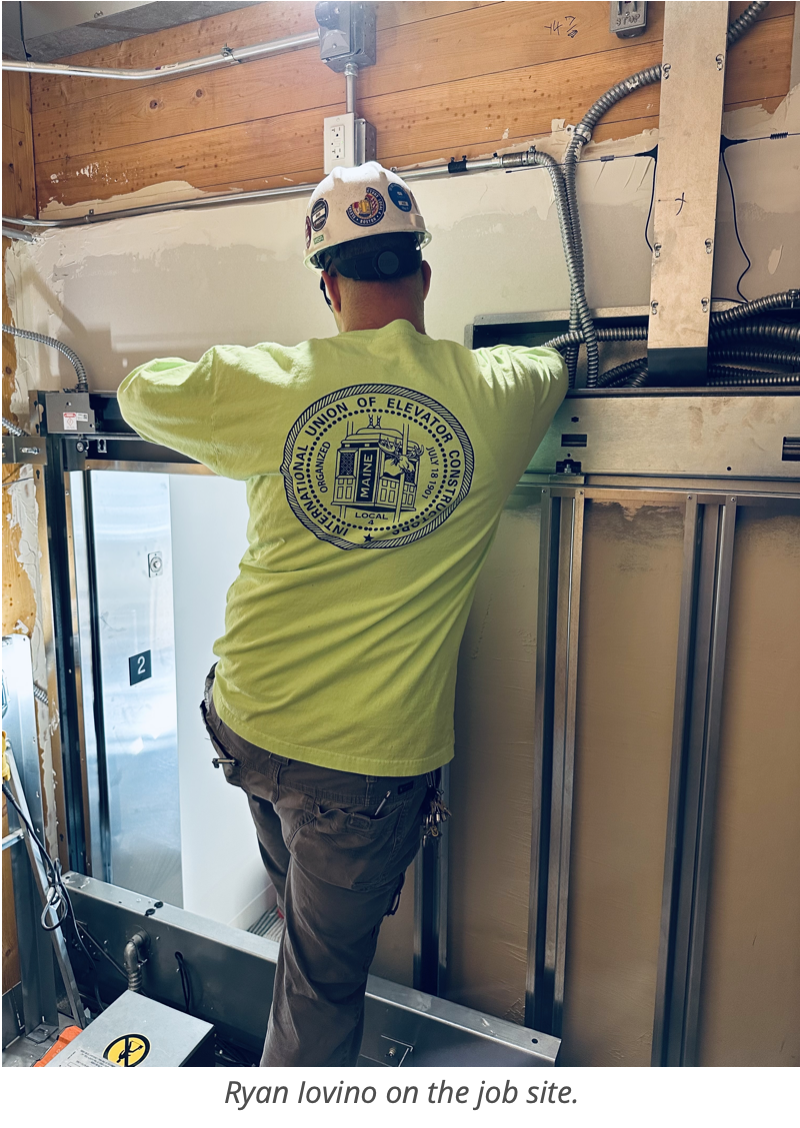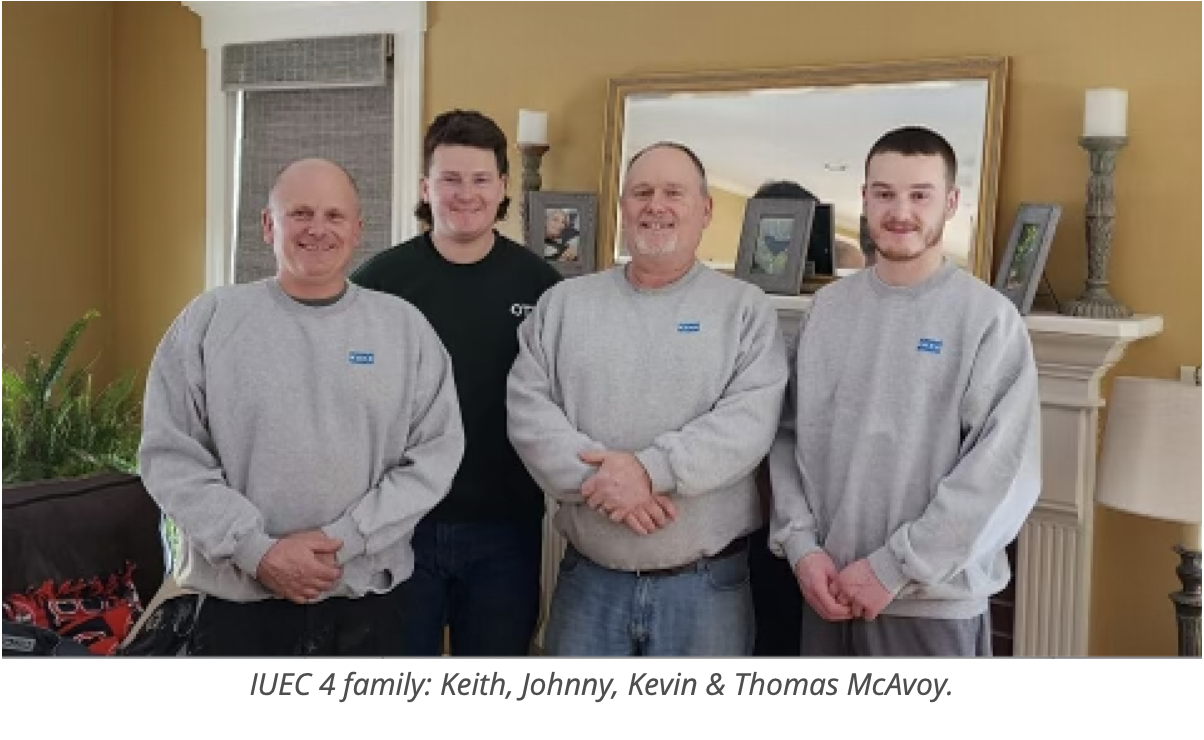Meet the Maine Elevator Constructors of Local 4

Photo: The Barajas family (IUEC): Pablo, Garrett, Miguel, Estevan & Juan Barajas.
When Ryan Iovino of Gray was a kid, he would often get strange looks when he said he wanted to be an elevator mechanic when he grew up.
“People would say they'd never even heard of anybody who does that work,” said Iovino, who serves on the executive board of the International Union of Elevator Constructors (IUEC) Local 4. “You kind of have to know somebody in the trade because a lot of people don’t even know it exists. Now I’m a fourth generation elevator guy and I absolutely love what I do.”
After 23 years in the trade, Iovino can’t recommend his trade enough to young people who are electrically and mechanically inclined.
"It’s like working on a huge car with the latest, greatest technology,” said Iovino. “Just when you think you’ve learned everything, something new comes out and you learn something new. Everyday you’re like ‘Wow! Ok!” It’s very exciting for me.”
Fellow Local 4 member Juan Barajas is similarly enthusiastic about his job. Like Iovino, he has a family connection to the trade as four of his brothers were already IUEC members when he started his apprenticeship in 1984. Since then, both Barajas’ son Estevan and nephew Nick have also joined the union.
“I don’t refuse the money they give me, but it’s not about the money,” said Barajas. “I could have retired years ago, but I love the job so much that I’m still out here laboring. Whenever some new technology comes out I want to go home and study it.”

As Local Business Agent Jeff Handibode explains, elevator construction is a hybrid of several different trades and his members have to be “a jack- of-all-trades and master of all of them too."
“You’re part ironworkers because you're welding, working on your own steel, setting your rails and beams,” says Handibode. “We wire all of the fixtures ourselves. The whole machine room, the hoist ways, buttons, bells and whistles are our work. We wire our own motors, pumps and generators, so we’re part electrician too. If it’s a hydraulic system, we’re running our own schedule 80 oil line to feed that system, so now we’ve got the skills of a plumber. And we do the cab work too, so we’re also carpenters. We also lay the stone floor in some elevators, so we’re also tile guys.”
There are currently 65 IUEC Local 4 members in Maine working from Aroostook County to New Hampshire and the I-495 corridor of northern Massachusetts. They are currently busy working on a hospital project in New Hampshire, the Maine Medical Center expansion project and what will become the tallest building in Maine at 201 Federal Street in Portland.
The History of IUEC Local 4

IUEC 4 was founded in Boston in 1899 with a mission to uphold the highest level of craftsmanship and safety and to “elevate the moral, intellectual and social conditions” of members and their families. IUEC also has contracts with the top four elevator companies in the industry, so IUEC members can count on steady work earning some of the highest wages in the trades with excellent health care and retirement benefits.
IUEC 4 fought for very strong safety standards in Massachusetts, which effectively prevents low-road, non-union contractors from undercutting the market there. As a result, Local 4 has 98.5 percent of the market share in Massachusetts compared to Maine where about 60 percent of elevator jobs are union. Handibode said he would love to see Maine establish a similar licensing board to regulate elevator construction and establish safety standards.
“Once we show non-union workers our wage and benefit package all of the sudden we don’t appear like the enemy anymore,” said Handibode. “We train them and entice them over because you get more bees with honey than with vinegar."
Handibode attributes Local 4's organizing and legislative success to past leaders like Ed Sullivan, Kevin Mcgettigan and Dave Morgan.
A Wildcat Strike
Prior to the late 1990s, Maine elevator constructors were part of Maine-based Local 95, but it merged with Local 4 around 2000 so they would have the resources to hire a full-time business agent. In a tremendous bargaining victory, Local 4 successfully negotiated with the elevator companies to gradually increase wages for Maine members to the same rate as Boston. At the time, the pay difference between the two states was $12 per hour.
However, that didn’t stop some elevator companies from trying to sow division among members by encouraging some to leave the union. Barajas recalled one time in the early 2000s when Maine IUEC members went on a wildcat strike in solidarity with a young apprentice who refused to work with another employee after the man brandished a gun at him. The gun brandishing mechanic also happened to be the only employee who refused to join the union. Learning that the apprentice was facing dismissal for his action, 20 IUEC members marched into the company office to demand that it keep the apprentice employed.
“We went in there and said, ‘you can’t pull this stuff with the young guys. It’s a safety issue,” said Barajas. “The kid is uncomfortable working with this guy and he’s got a dangerous job on top of that. That was the very first time that the men in the company actually walked out.”
The Maine workers stayed out for several days and the company ended up taking Local 4 to federal court over the action. But in the end the apprentice kept his job and the anti-union mechanic was never assigned another partner again.
“That was the first action we ever did as a group that actually set a big company down,” said Barajas. “It was awesome and it really showed the strength of the union.”
Going Above Beyond for People in Need
Local 4 members are known for their philanthropic work to help people in need. The union sponsors annual charitable golf tournaments and boxing matches to raise money for its “Lift for a Vet” program that provides free stairlifts, wheel chair lifts and residential elevators for military veterans with disabilities.
In 2010, Juan Barajas learned of a young girl named Bella in Londonderry, New Hampshire who lost both arms and legs due to a rare infection. The health emergency caused the family great financial strife as her parents took leave from their jobs as flight attendants to be by their daughter’s side. The Barajas family joined 300 trades people in donating their time to upgrade the house to accommodate Bella’s disability. Barajas, along with two of his brothers, his nephew and son spent five days installing the new elevator. Once, when the elevator got stuck on the top floor, Barajas drove to New Hampshire on a holiday to fix it himself at no cost
“Her mother was like ‘I can’t believe that you would come down here on your day off to fix our elevator,’” recalled Barajas. “That just hit me in the heart and I said, ‘I know your daughter doesn’t get a day off from her illness. This is probably the best thing I can do on my day off.’”
Become an Elevator Constructor

If you are you or someone you know are interested in pursuing a challenging and rewarding career in the elevator construction trade, you can learn more about how to apply to the National Elevator Industry Apprenticeship Program (NEIP) here.
“I can’t say enough good things about being in a union. We’ve got a livable wage, excellent health and retirement benefits and workplace safety and our schooling produces the best of the best,” said Iovino. “It’s just a great way to live life. I live a very comfortable life and I owe that all to IUEC Local 4.”
If you want to learn more about all kinds of registered apprenticeship opportunities in Maine contact Sam Boss, the Maine AFL-CIO's Apprenticeship & Equity Director, sam@maineaflcio.org.
